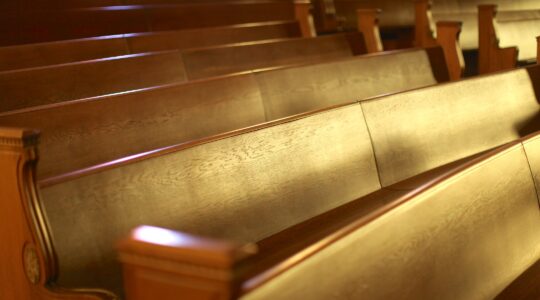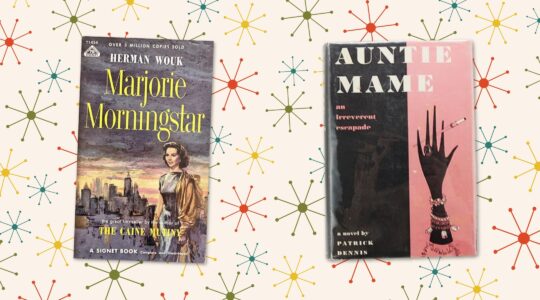When I was growing up, my father was a rabbi at a number of congregations. On Yom Kippur I always stood in awe of my Dad’s Torah and his piety. When it came to the Avodah part of the traditional musaf liturgy specific for Yom Kippur, my father would have the chazan read the paragraphs in an undertone while he read a most beautiful English rendition that truly captured the essence of the Kohen Gadol’s (High Priest’s) work. It was that dramatic reading that served as my peirush, my interpretation of an ancient and admittedly bloody and scary ritual.
I could understand its importance and feel the true awesomeness of the day.
Last year at this time, the Jewish social media world was abuzz with a powerful and beautiful new song called Avodah by Israeli-French artist, Yishai Ribo. The song was a certifiable hit in Israel and the U.S. On our most recent trip to Israel (BC- before Covid-19), my husband and I got to hear Ribo along with renowned Jewish artist, Avraham Fried, sing this or more specifically daven this song to and with 9,000+ fans, all of whom knew every word of this stirring melody by heart.
Ribo brilliantly refashions the ancient liturgy, making it accessible for the masses. For example, Ribo takes the description of the accounting (achat- achat v’achat) the Kohen Gadol did while sprinkling the blood of the sacrifices in the Holy of Holies, the Kodesh Kedoshim, and turns it into the ‘counting’ or assessment we make of our own character.
And it is not only an assessment of the bad things we have done or the bad ways in which we behave.
Ribo, by incorporating the thoughts of Rav Kook and others, broadens that review to also all the good things that we do and the ways that we are good. Ribo encourages us to embrace what true humility means when we stand before the Almighty. Humility in our tradition does not mean to see ourselves as only a collection of bad actions, deeds and thoughts, as nothingness. Humility means to have an honest assessment of who we are—the bad and the good.
To stand humbly before God on the holiest day and as well as every other is to tell the truth about yourself but still being your own best advocate.
Only then can you improve and maybe more importantly, you can get out of your own way, get beyond yourself to be able to truly serve God. This way of humility is a way to free yourself, remove the noise in your head, to renew your relationship with God and potentially do great things — maybe even like Moshe Rabbanu, who the Torah tells us was the most humble.
At the end of the Avodah pageantry—after all the sacrificing, sprinkling, atonement, testimony, immersions and costume changes—the Kohen Gadol with his face radiant, hurries to put on his own, plain clothes.
תאר מגמתו כצאת השמש בגבורה ,תקף ודץ ועטה בגד הונו….
‘The look upon his face was that of the sun coming out in all of its might, and he hastened, ran and put on his own clothes.’
Ribo’s refrain is
יצא ממקום שיצא, ורעד במקום שעמד, פשט בגדי זהב לבש בגדי עצמו
וכל העם והכהנים היו מלווים אותו לביתו ויום טוב לאוהביו…
‘He came out from the place he had left and trembled in the place where he had stood, took off his golden garments and put on his own clothes. And all the people and the priest would accompany him to his own home and it was a festive day for his loved ones…’
The face of the Kohen Gadol is shining— a big relief- because he made it out alive- b’li pegah-without injury-with his encounter with God. Perhaps he’s shining because he knows God will forgive him and his family and the entire Jewish people and he is beaming with pride because of a job well done.
But what is most powerful is that the Kohen Gadol takes this entire awesome and splendid experience and he returns to himself, to his own family and to his own home.
As a youngster, I was always jealous of the Kohen Gadol at this point in the liturgical narrative. He got to put on comfy clothes and go home. My family couldn’t go home and rest. We had to stay dressed up, polite and engaged. We were required to continue being like angels – as some in our tradition describe our state on Yom Kippur – at the same level of attention we had been maintaining all day. There was no time to process, no time to ‘come down’ so to speak and certainly no changing into sweats. My discomfort aside, I guess my greatest disappointment was that whatever transformation I might have had on Yom Kippur wouldn’t have a chance to be realized until I finally got home—got back to real life.
For like the Kohen Gadol, we all have a chance today to feel the warmth of God’s presence and indeed we act like angels today. But only today, because while we can act like angels, we are still human. At the end of the day, we will go back home and take off our wings.
But hopefully that radiance that is on our faces—that essence of God- will filter into our every day and transform our real lives.
The Kohen Gadol was able to bring the essence of the day into his life and his home and transform, change himself and those around him. But he doesn’t stay in the Kodesh Kedoshim.– He doesn’t live there because as a human, he really couldn’t. He’s accompanied by the other Kohanim to his house.
He doesn’t transcend his existence but with God’s help, he changes it and brings light to all.
And so when listening to the Chazan read this Avodah service (and perhaps some of us will be hearing Ribo’s beautiful melody and lyrics in our own heads), let’s use the experience to help us change, to transform while remaining human.
Now more than ever perhaps that transformation is a not so much of a change but a recognition of our true humanity and limits. It means that this year we will need to use the extra boost of heavenly help to amplify certain aspects of being human that are also Godlike — compassion and kindness — and to remember that most of all those traits must be used for our own selves first, before helping anyone else.
We must learn to forgive ourselves and cut ourselves some spiritual and physical slack.
We have all suffered great losses this year. Some have unthinkably lost loved ones. The message from the Kohen Gadol’s return home is to not set the impossible bar of becoming an angel but rather being the best humans we can be. With God’s countenance shining on us, we too can beam as brightly as the Kohen Gadol and have that light lift us up with love and forgiveness.
Rabbi Marianne Novak recently received Semikha from Yeshivat Maharat. She lives in Skokie, IL with her husband Noam Stadlan. She is an educator for the Melton Adult Education Program and a Gabbait for the Skokie Women’s Tefillah Group.
Posts are contributed by third parties. The opinions and facts in them are presented solely by the authors and JOFA assumes no responsibility for them.
If you’re interested in writing for JOFA’s blog contact dani@jofa.org. For more about JOFA like us on Facebook or visit our website.
The New York Jewish Week brings you the stories behind the headlines, keeping you connected to Jewish life in New York. Help sustain the reporting you trust by donating today.




